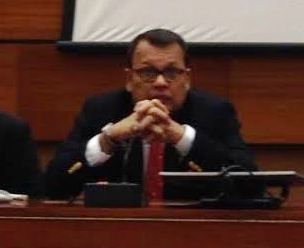 Plantation Industries Minister and Special Envoy of the President on Human Rights, Mahinda Samarasinghe, who addressed a briefing on Sri Lanka for the Member and observer states of the African region of the UN Human Rights Council on Tuesday (18), at the UN Office at the Palais des Nations in Geneva, said that the attempt made in the latest version of the Resolution on Sri Lanka sought to introduce an inquiry under the guise of an “investigation” by the Office of the High Commissioner for Human Rights (OHCHR), was no less than an effort to initiate an international inquiry mechanism.
Plantation Industries Minister and Special Envoy of the President on Human Rights, Mahinda Samarasinghe, who addressed a briefing on Sri Lanka for the Member and observer states of the African region of the UN Human Rights Council on Tuesday (18), at the UN Office at the Palais des Nations in Geneva, said that the attempt made in the latest version of the Resolution on Sri Lanka sought to introduce an inquiry under the guise of an “investigation” by the Office of the High Commissioner for Human Rights (OHCHR), was no less than an effort to initiate an international inquiry mechanism.
“Such a move violates the founding principles of the Human Rights Council. Despite its position against the Resolution, Sri Lanka was committed to moving forward with the several domestic processes it had put in place to address issues connected with the conflict,” Minister Samarasinghe said.
The Minister stated that Sri Lanka has shown its commitment to comprehensive reconciliation through the significant advances made on many fronts. These include processes set in place to address accountability issues. All of this has been achieved in a brief span of five years since the end of the armed conflict in 2009 when the humanitarian operation culminated in the defeat of the terrorists.
“We have not remained static,” he said, outlining the progress achieved in resettlement, rehabilitation of ex-combatants, restoration of democratic institutions, rebuilding of physical infrastructure, strengthening of administrative systems and ensuring the return of normality in conflict affected areas in addition to fostering economic growth and prosperity.
Minister Samarasinghe called on the countries from the African Region to demonstrate their solidarity with Sri Lanka during and after the Sessions of the Human Rights Council.
He reminded them that Sri Lanka had commenced the practice of briefing regional and cross regional groups of nations at the Council as far back as 2006 – long before any resolution was contemplated – indicating Sri Lanka’s willingness to inform and engage with the international community. He said that other countries represented in the room could face a similar situation based on selective targeting.
“Today it could be Sri Lanka and tomorrow it could be any other country,” he added.
Courtesy: dailynews.lk

Leave a comment